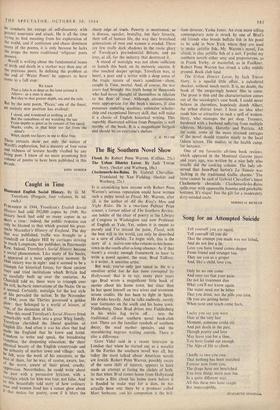The Big Southern Novel Show
Ir is astonishing how anyone with Robert Penn Warren's serious reputation could have written such a pulpy novel as Flood. Mr. Warren, after all, is the author of All the King's Men and Night Rider. He is a two-time Pulitzer Prize winner, a former editor of The Southern Review, one holder of the chair of poetry at the Library of Congress in Washington and now Professor of English at Yale. Yet, unless it is meant as parody and I've missed the point, Flood, with the best will in the world, can only be described as a stew of clichés, To begin with, this is the story of a native-son-who-returns-to-his-home- town-in-the-south-after-a-long-absence. As if that wasn't a creaky enough framework to have to write a novel against, the man, Brad Tolliver, is a writer. A sensitive artist.
But wait, you've only just tuned in. He is a sensitive artist but he has been corrupted by Hollywood; that is to say, many pure years ago .Brad wrote a magnificent little book of stories about his home town, but since then he has spent himself on two wives and seventeen screen credits. He has been to fight in Spain. He drinks heavily. And he talks endlessly, mostly sour footnotes on the south and his home town, Fiddlesburg. Once Brad drives into Fiddlesburg in his white Jag we're off . . . into the traditional all-star southern novel book-club cast. There are the familiar symbols of southern decay, the mad mother upstairs, and the smouldering negroes waiting outside. There is also a difference.
Gore Vidal said in a recent interview in London that when he started out as a novelist in the Forties the southern novel was all, but today the most talked about American novels are Jewish. Robert Penn Warren, possibly aware of the same shift of interest, appears to have made an attempt at fusing the cliches of both. So that when Brad comes home from Hollywood to write a film about his home town before it is flooded to make way for a dam, he has actually been sent there by a producer called Mort Seebaum, and his companion is the bril- liant director, Yasha Jones. An even more telling contemporary note is struck by one of Brad's old friends who breeds buffalo fish in his pond to be sold in New York where they are used to make gel lithe fish. Mr. Warren's novel, I'm afraid, is also gef lithe fish of a sort. I prefer my southern novels either sexy and preposterous,' as in Frank Yerby, or masterful, as in Faulkner. Robert Penn Warren has struck a talky middle ground. Book club land.
The Urban District Lover, by Jack Trevor Story, is a squalid little affair, a calculated shocker, without much merit. It is, no doubt, the book of 'the unsparingly honest' film to come. The prose is thin and the characterisation conies out of the sociologist's case book. I could never believe in charmless, hopelessly dumb Albert, the urban district lover. I have no idea what made him so attractive to such a spill of women. Hetty, who manages the pet shop. Treasure, burdened with a husband suffering from multiple sclerosis. Marjorie, Dorothy and Patricia. All the' same, some of the more strained outrages of the novel should transfer nicely to the local Odeon screen. The nudists in the health camp, for instance.
One of my favourite all-time book reviews, which appeared in the Montreal Gazette years and years ago, was written by a nice lady who usually did the cooking column. The lady ob- served that Jean-Paul Sartre's La Nausee was 'lacking in the traditional Gallic charms.' The same cannot be said of Gabriel Chevallier's latest Clochemerle chronicle. Clochenterle-les-gains spills over with squeezable bosoms and pinchable bottoms. It's risque. Just the gift for a moderately dirty-minded uncle.
MORDI'.C.11 RICHLER


































 Previous page
Previous page